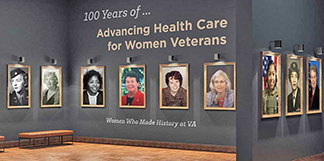This Women’s History Month, VA celebrates 100 years of advancing health care for women Veterans.
The milestones and achievements throughout the last 100 years are integral chapters in the story of VA. This recognition includes the work of many who advocated for women Veterans to receive the health care services they’ve earned and deserve.
How it began
Women have served in the U.S. military since the American Revolution. They served in combat, disguised as men during the American Revolution and Civil War. They served on the front lines during the World Wars. However, it took the advocacy of groups such as the Women’s Overseas Service League to fight for the right for women Veterans to be seen at Veterans’ hospitals and care homes.
On Sept. 14, 1923, VA’s predecessor, the National Home for Disabled Volunteer Soldiers, approved the first hospital spaces for women Veterans who served as Army or Navy nurses during World War I.
Throughout the next 100 years, VA made significant achievements that improved health care services and care coordination for women Veterans.
A brief history
In the 1940s, VA began hiring women physicians and leadership who specialized in women’s health and opened the first medical facilities designated to treat women Veterans.
The 1980s saw a renewed focus on issues and barriers to care pertaining to women Veterans. Established in 1983, the National Advisory Committee on Women Veterans assessed the needs of women Veteran issues and recommended changes to help them receive care. One result was VA appointed the first Women Veterans Coordinators and established the Woman Veterans Health Program.
VA established the Center for Women Veterans to improve engagement with women Veterans. The center conducts outreach to women Veterans, increases site visits to VA facilities, provides briefings to Congress, and held the first “National Summit on Women Veterans Issues” in Washington, D.C. This summit was the first time women Veterans from across the nation had the opportunity to come together with policymakers and VA officials.
Women VA health care users doubled
Between 2000 and 2013, women Veteran VA health care users doubled, from 159,000 to 390,000. Due to the rapid increase in women Veterans using VA health care, in 2008 VA committed to hiring a full-time Women Veteran Program Manager at each medical center and in 2009 launched the Women Veterans Call Center.
VA invested more than $16.5 million in 86 studies on women Veterans’ health in 2013 and also funded the Women’s Health Collaborative Research to Enhance and Advance Transformation and Excellence (CREATE), a research initiative aimed at better meeting the needs of women Veterans.
The past decade in women Veterans’ health care
Within the last decade, VA has focused on further enhancing health care services and providing a welcoming atmosphere at VA facilities.
With the support of Congress, Veteran advocates, and Veteran Service Organizations, VA improved offerings in the areas of fertility, newborn care, maternity care, childcare, sexual assault and trauma, and homelessness. They also support LGBTQ+ gender-affirming care, readjustment assistance, legal and supportive services and help with reproductive health.
VA launched the White Ribbon campaign and End Harassment programs aimed at improving women’s experiences at VA medical centers.
How can I access care?
You belong at VA. To enroll in VA health care, call or text the Women Veterans Call Center at 855-829-6636. Representatives are available Monday through Friday, 8 a.m. to 10 p.m. ET, and Saturday, 8 a.m. to 6:30 p.m. ET.
If you call after hours, we will return your call the next day we are open. For more information, you can download a handout on eligibility or visit the VA Women Veterans Health Care website.
Topics in this story
More Stories
Veteran Byron Potier weighed almost 300 pounds and was tired and lethargic. He was the perfect candidate for gastric sleeve surgery.
How much do you know about VA care, benefits and services? Don’t miss out on what you've earned—check out the "2025 VA Federal Benefits Guide for Veterans, Dependents, Survivors, and Caregivers" handbook to learn more.
Feeling stressed? Your breath can help you relax and focus. Take 3 minutes to reset and prioritize your well being for this week's #LiveWholeHealth practice.







